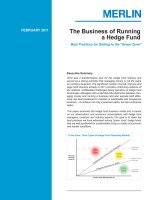The Project Gutenberg eBook, The Business of Being a Woman, by Ida M. Tarbell pptx
Bạn đang xem bản rút gọn của tài liệu. Xem và tải ngay bản đầy đủ của tài liệu tại đây (762.24 KB, 334 trang )
The Project
Gutenberg
eBook, The
Business of
Being a Woman,
by Ida M.
Tarbell
This eBook is for the use of anyone
anywhere at no cost and with
almost no restrictions whatsoever. You may
copy it, give it away or
re-use it under the terms of the Project
Gutenberg License included
with this eBook or online at
www.gutenberg.net
Title: The Business of Being a Woman
Author: Ida M. Tarbell
Release Date: August 21, 2005 [eBook
#16577]
Language: English
Character set encoding: ISO-8859-1
***START OF THE PROJECT
GUTENBERG EBOOK THE BUSINESS
OF BEING A WOMAN***
E-text prepared by
Audrey Longhurst,
Jeannie Howse,
and the Project
Gutenberg Online
Distributed Proofreading
Team
( />
Transcriber's Note: The few
spelling mistakes found in
this text were left intact.
THE BUSINESS
OF BEING A
WOMAN
THE MACMILLAN COMPANY
NEW YORK · BOSTON · CHICAGO
DALLAS · SAN FRANCISCO
MACMILLAN & CO., LIMITED
LONDON · BOMBAY · CALCUTTA
MELBOURNE
THE MACMILLAN CO. OF CANADA,
LTD.
TORONTO
THE
BUSINESS OF
BEING
A WOMAN
BY
IDA M. TARBELL
ASSOCIATE EDITOR OF THE
"AMERICAN MAGAZINE"
AUTHOR OF "LIFE OF ABRAHAM
LINCOLN"
"HISTORY OF THE STANDARD
OIL CO."
"HE KNEW LINCOLN," ETC.
New York
THE MACMILLAN COMPANY
1921
All rights reserved
1912,
By THE PHILLIPS PUBLISHING
COMPANY.
1912,
By THE MACMILLAN COMPANY.
Set up and electrotyped. Published October,
1912.
Norwood Press
J.S. Cushing Co.—Berwick & Smith Co.
Norwood, Mass., U.S.A.
TO
E.I.T. AND C.C.T.
INTRODUCTION
The object of this little volume is to
call attention to a certain distrust, which
the author feels in the modern woman, of
the significance and dignity of the work
laid upon her by Nature and by society. Its
ideas are the result of a long, if somewhat
desultory, observation of the professional,
political, and domestic activities of
women in this country and in France.
These observations have led to certain
definite opinions as to those phases of the
woman question most in need of emphasis
to-day.
A great problem of human life is to
preserve faith in and zest for everyday
activities. The universal easily becomes
the vulgar and the burdensome. The
highest civilization is that in which the
largest number sense, and are so placed as
to realize, the dignity and the beauty of the
common experiences and obligations.
The courtesy of the publishers of the
American Magazine, in permitting the use
here of chapters which have appeared in
that periodical, is gratefully
acknowledged.
TABLE OF
CONTENTS
CHAPTER
PAGE
I.
The Uneasy
Woman
1
II.
On the
Imitation of
Man
30
III.
The
Business of
Being a
Woman
53
The
IV. Socialization
of the Home
84
V.
The Woman
and her
Raiment
109
VI.
The Woman
and
Democracy
142
VII.
The
Homeless
Daughter
164
VIII.
The
Childless
Woman and
the
Friendless
Child
190
On the
IX.
Ennobling of
the Woman's
Business
216
THE BUSINESS OF
BEING A WOMAN
CHAPTER I
The Uneasy Woman
The most conspicuous occupation of the
American woman of to-day, dressing
herself aside, is self-discussion. It is a
disquieting phenomenon. Chronic self-
discussion argues chronic ferment of
mind, and ferment of mind is a serious
handicap to both happiness and efficiency.
Nor is self-discussion the only exhibit of
restlessness the American woman gives.
To an unaccustomed observer she seems
always to be running about on the face of
things with no other purpose than to put in
her time. He points to the triviality of the
things in which she can immerse herself—
her fantastic and ever-changing raiment,
the welter of lectures and other culture
schemes which she supports, the
eagerness with which she transports
herself to the ends of the earth—as marks
of a spirit not at home with itself, and
certainly not convinced that it is going in
any particular direction or that it is
committed to any particular worth-while
task.
Perhaps the most disturbing side of the
phenomenon is that it is coincident with
the emancipation of woman. At a time
when she is freer than at any other period
of the world's history—save perhaps at
one period in ancient Egypt—she is
apparently more uneasy.
Those who do not like the exhibit are
inclined to treat her as if she were a new
historical type. The reassuring fact is, that
ferment of mind is no newer thing in
woman than in man. It is a human ailment.
Its attacks, however, have always been
unwelcome. Society distrusts uneasiness
in sacred quarters; that is, in her
established and privileged works. They
are the best mankind has to show for
itself. At least they are the things for
which the race has slaved longest and
which so far have best resisted attack. We
would like to pride ourselves that they
were permanent, that we had settled some
things. And hence society resents a
restless woman. And this is logical
enough.
Embroiled as man is in an eternal effort
to conquer, understand, and reduce to
order both nature and his fellows, it is
imperative that he have some secure spot
where his head is not in danger, his heart
is not harassed. Woman, by virtue of the
business nature assigns her, has always
been theoretically the maker and keeper of
this necessary place of peace. But she has
rarely made it and kept it with full content.
Eve was a revoltée, so was Medea. In
every century they have appeared, restless
Amazons, protesting and remolding. Out
of their uneasy souls have come the
varying changes in the woman's world
which distinguish the ages.
Society has not liked it—was there to
be no quiet anywhere? It is poor
understanding that does not appreciate
John Adams' parry of his wife Abigail's
list of grievances, which she declared the
Continental Congress must relieve if it
would avoid a woman's rebellion. Under
the stress of the Revolution children,
apprentices, schools, colleges, Indians,
and negroes had all become insolent and
turbulent, he told her. What was to
become of the country if women, "the most
numerous and powerful tribe in the
world," grew discontented?
Now this world-old restlessness of the
women has a sound and a tragic cause.
Nature lays a compelling hand on her.
Unless she obeys freely and fully she must
pay in unrest and vagaries. For the normal
woman the fulfillment of life is the making
of the thing we best describe as a home—
which means a mate, children, friends,
with all the radiating obligations, joys,
burdens, these relations imply.
This is nature's plan for her; but the
home has got to be founded inside the
imperfect thing we call society. And these
two, nature and society, are continually
getting into each other's way, wrecking
each other's plans, frustrating each other's
schemes. The woman almost never is able
to adjust her life so as fully to satisfy both.
She is between two fires. Euripides
understood this when he put into Medea's
mouth a cry as modern as any that Ibsen
has conceived:—
Of all things upon earth that
grow,
A herb most bruised is
woman. We must pay
Our store of gold, hoarded
for that one day,
To buy us some man's love;
and lo, they bring
A master of our flesh! There
comes the sting
Of the whole shame. And then
the jeopardy,
For good or ill, what shall
that master be;
'Tis magic she must have or
prophecy—
Home never taught her that—
how best to guide
Toward peace this thing that
sleepeth at her side.
And she who, laboring long,
shall find some way
Whereby her lord may bear
with her, nor fray
His yoke too fiercely, blessed
is the breath
That woman draws!
Medea's difficulty was that which is
oftenest in the way of a woman carrying
her business in life to a satisfactory
completion—false mating. It is not a
difficulty peculiar to woman. Man knows
it as often. It is the heaviest curse society
brings on human beings—the most fertile
cause of apathy, agony, and failure. If the
woman's cry is more poignant under it
than the man's, it is because the machine
which holds them both allows him a wider
sweep, more interests outside of their
immediate alliance. "A man, when he is
vexed at home," complains Medea, "can
go out and find relief among his friends or
acquaintances, but we women have none
to look at but him."
And when it is impossible longer to
"look" at him, what shall she do! Tell her
woe to the world, seek a soporific,
repudiate the scheme of things, or from the
vantage point of her failure turn to the
untried relations of her life, call upon her









